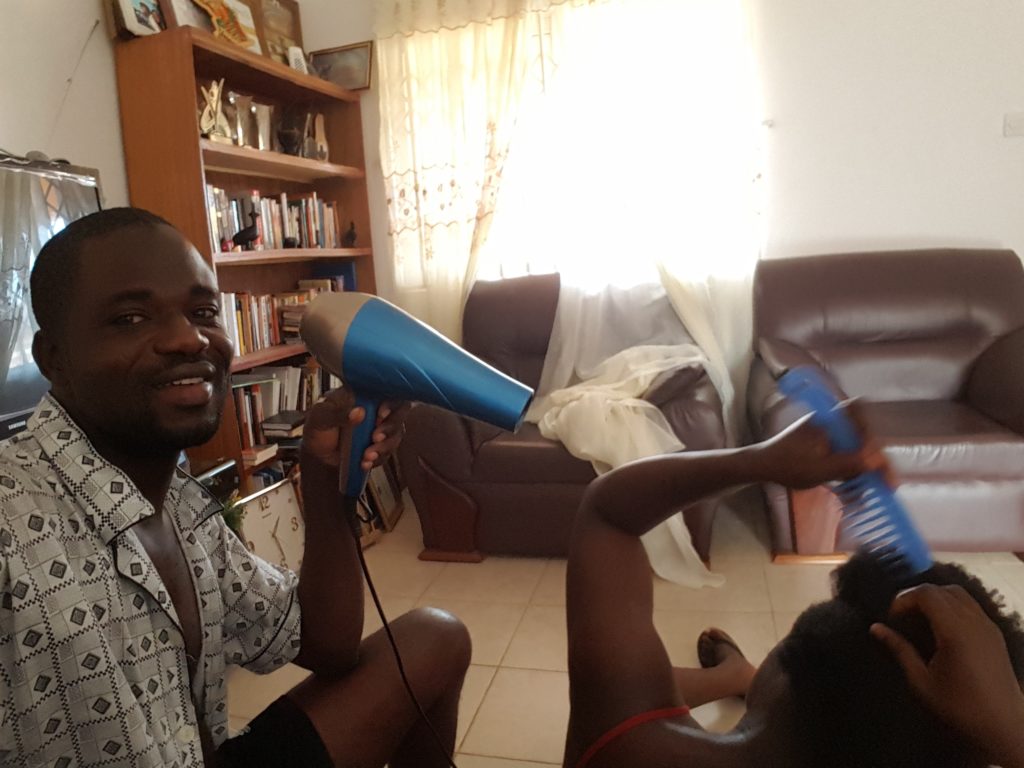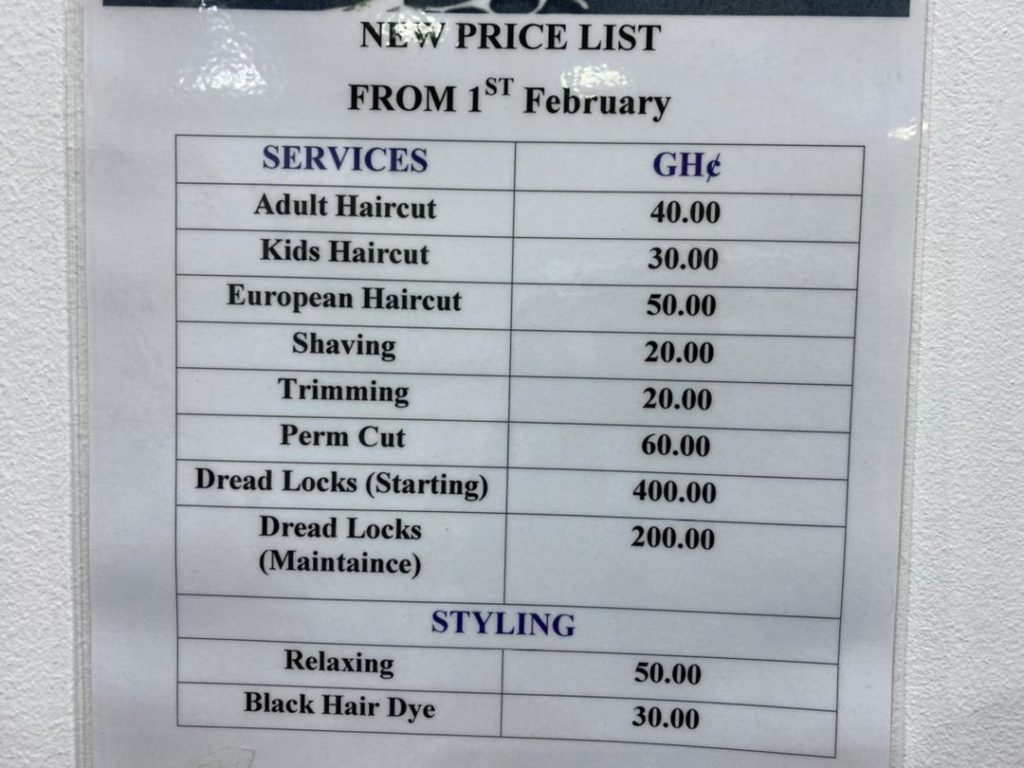When I met my wife, her hair was natural. Not only was it her own hair, but she hadn’t permed or relaxed it. She kept softening creams at bay and battled with it every day.
I love natural hair. That love has nothing to do with the stingy men association’s hatred for the hairdresser’s salon. It is equally expensive to nurture natural hair. And it needs time, a lot of attention.
We black people generally have kinky short hair. Keeping it from entangling or being rebellious to the comb means one has to get a lot of time for it when it grows beyond a certain level. And one must feed it nutritious menus if one wants to keep it healthy.
To stop the outgrown natural hair from competing with daily activities for attention, one might want to lock it permanently. This, however, makes no room for discretion on the different ways one might want one’s hair to look.
So, my wife’s hair remained. And I was often called to help, which I dutifully and gleefully obliged. Then, one day, as if stung by a venomous bee of frustration, my wife decided she was going to have her hair relaxed.
“Oh, why?” I asked.
“I’m tired,” she said.
Well, relaxing one’s hair comes with its own time and resources, but keeping relaxed hair from entangling takes less effort than natural hair.
I sometimes keep my hair moderately bushy. It’s, however, nowhere near the length of my wife’s former hair. It’s something I started doing when the fear of Covid-19 forced me to sparsely space my visit to the barber’s salon. But whenever my hair outgrows the teeth of my comb, I spend more time trying to get the towel to soak up the water in my hair after bathing. And if I forget to comb while it’s still wet, then I have to brace up for a fight with the comb.

With these experiences, if my son or daughter is going to a pre-tertiary boarding school, I’ll advise them to keep their hair short. They won’t have access to a hairdressing salon. Besides, they need to focus on their studies and shouldn’t be saddled with decisions on hair products or salons.
It is for these, and other practical, reasons I disagree with those who, in the wake of the Achimota School’s dreadlocks discussions, say the length of one’s hair should not matter.
Achimota School has insisted that two boys who gained admission to the school must cut their dreadlocks. The boys say their hair is a relic of their Rastafarian religion. The standoff is dividing the nation.
The liberals and conservatives have positions that are more entrenched than the roots of the baobab tree. The conservatives, whose views appear drowned by human rights-touting liberals, support the decision of the school. The liberals, however, think the school has no business policing the hairs of students. The length of one’s hair, they argue, does not correlate with the sharpness of their brain.
The third group that has swelled the number of people opposing the decision of Achimota School is those that miss no opportunity to blame the white man for the woes of the black man. They deride Achimota as a symbol of colonialism because it is a school that was established by the colonial government. Ironically, this is the school that embraced one of Ghana’s best composers of all time, Dr. Ephraim Amu, when the Presbyterian Church would not allow him to preach in the traditional African cloth.
Prejudices and reality about natural hair and Rastafarian hair
There are many inherent prejudices about the nature of one’s hair. Growing up, one’s sanity or character could be read from one’s hair. In a country that mental health is yet to be given the needed attention, one way of identifying a “mad person” in a community is by looking at their clothing and their hair.
Some of us also grew up in communities where the bad boys could be rightly differentiated from the decent ones by looking at their hair. The weed smokers, thieves, and other criminals had a way of sporting their hair. It was common to hear a parent advise his son to keep his hair tidy so that if he was in public transport and something got lost, he wouldn’t become the obvious target. Whenever the police organise a swoop on suspected criminals from the notorious dens, there is often something about their hair that makes them different from the ordinary person you meet in the street.
There are people whose perceptions about Rastafarians are informed by these prejudices. I might have had this prejudice if I hadn’t encountered Rastafarians. They are some of the kindest and most honest people I have encountered. They are free thinkers, ever willing to share and welcome others. They don’t discriminate. There might be something about Rastafarian men that makes them attractive to white female students in our universities.
“One love, brother!” they would say.
Rastafarians keep dreadlocks. Some Rastafarian dreadlocks are very kempt. That of others look like the tails of animals running acute diarrhoea.
Is Achimota School Right or Wrong?
In this raging debate, I see some very valid points advanced by both sides. Some have argued that it’s against the right of the Rastafarian student to be asked to cut his hair or forfeit admission to Achimota. I have also heard a very good argument that says there must be exceptions to every rule. And I agree with this school of thought, especially if that exception doesn’t hurt or defeat the purpose of the rule.
How many Rastafarians do we have in Ghana? Their number is very negligible. You hardly find students in dreadlocks seeking admission in senior high schools. So, what harm would an exception for two students to wear dreadlocks cause Achimota School? After all, they aren’t wearing it for fun.
This, however, calls for a better understanding of the Rastafarian religion and how central dreadlocks are to the religion. A school or institution may deny Muslims the right to wear the hijab in general or the “letterbox” kind of hijab that leaves only the eyes, which some sects in Islam prefer. Muslims can still exercise their faith in high schools without the hijab. After all, not all female Muslims wear the hijab. But no school can force Muslims to eat pork. So even though the hijab and pork are related to the Islamic faith, one is more central than the other.
I cannot pretend to know enough about Rastafarianism to know what their hair means to them and how central dreadlocks are to their faith. But I know some Rastafarians do not have dreadlocks, while others have dreadlocks and beards. For some, however, God denied them the choice to wear dreadlocks or not. The baldheaded and people from races whose hair can’t be locked can still be Rastafarians.
Some may argue that it isn’t in anybody’s place to determine what is central or not. I disagree with this because if we allowed just anything based on religious doctrines, then there would be chaos in our schools. Christianity, for instance, has no uniform doctrines. There are many weird “Christian” practices and doctrines that are sometimes intolerable. The orthodox, Catholics, Pentecostals, Adventists, and the Jehovah’s Witnesses as well as the latter-day barefoot and long-robbed denominations, otherwise known as ‘spiritual churches’ all have their taboos. If a secondary school allows everybody to manifest their own beliefs, there would be chaos.
I agree with those who say an exception could be made for the Rastafarian students. Their number is very negligible. If an exception is made for Caucasian students, why should there be a problem with Rastafarians?
The question I’m unable to answer, however, is the implication for such precedent based on religion. Does it mean if anyone goes to a senior high school and prefers to wear any type of dreadlocks and say they are Rastafarians they should be allowed? And can a school that gives a waiver to Rastafarians based on religion deny African traditional believers or any sect of Christianity or Islam from professing their preferred faith regarding how they dress or live on campus?
Caucasian Hair and Black Hair
Some have said since Caucasian students are allowed to wear long hair, black students should also be allowed to wear long hair.
The secondary schools do not forbid students from wearing their natural hair. We black people generally have short and kinky hair. Caucasians have long and silky hair. For a black to have long hair, they must make the conscious effort to grow it, whether natural or permed. Even after many years of keeping our hair, we are still not able to get our hairs to be as long as the Caucasians. It is the reason hair extensions are a multibillion-dollar industry in Africa and the world of black people.
The natural hair of a fifteen-year-old African girl and a fifteen-year-old Caucasian girl isn’t the same. Among the “whites”, the texture and length of hair differ is different among the sexes.
In our schools, African students are not asked to shave their hair. They are only asked to trim them. An African girl who trims her natural, short and kinky hair will still have a thick tuft of hair covering her head while a Caucasian girl who is asked to trim hers to the level of the black girl is likely to lose almost every hair and expose her scalp.
Even though African boys and girls are expected to trim their hairs in our high schools, the girls keep longer hairs than the boys. And our schools don’t only emphasise the length of the hair. The shape and colour and style of the haircut matter. Your hair may be short, but if it’s a “bad boy’s haircut” you would attract the attention of school authorities.
This hair issue should not pit blacks against white. Our natural hairs are different and one rule must not necessarily apply to all, especially when one considers the fact that reasons high schoolers here have regulations on their hairs and the fact that it isn’t only the length of the hair that is emphasized. There’s a difference between equity and equality. Equity is also fair. Equality may not always be fair.
I disagree with the blanket assertion that is discriminatory to allow Caucasian girls to wear their hairs long while their African counterparts wear theirs short. One is naturally short and one is long. The average black woman who keeps her hair without cutting still wears hair extensions.

Is it the School’s business to Police Hair?
I have attended public schools throughout my life. And I have been a student leader in almost all my student life. I was an assistant school prefect in the primary school and the senior school prefect in both the junior high school and senior high school. At the Ghana Institute of Journalism, I was the SRC President. I fought for students throughout my life. Student-leadership has taught me that it’s sometimes easier to shepherd an army of frogs in the same direction than herding young people in the right direction.
In a country where values are eroded and discipline is banished from all spheres of our lives, it’s dangerous to overly push the argument of liberalism in our high schools. Last year when many high school students went berserk assaulting exam invigilators and destroying school property because they were not allowed to cheat, we didn’t hear that anarchy from the likes of Achimota and the other well-disciplined schools. Those schools have maintained their top spots because of their discipline, values, and enforceable school rules.
I once visited Wesley Girls’ High School and realised that the students in one particular house had the same colour of buckets. In a country where some are filthy rich and others can barely provide their basic needs, uniformity in our senior high schools does not only ensure discipline, but it’s our best attempt at egalitarianism.
Tell high schoolers they can wear whatever hair they choose and some will intimidate others with Brazilian and Indian hair extensions and all manner of things.
We must not also create the impression that discrimination on the basis of hair only exists in only high schools in Africa. There are some Rastafarian hairstyles and dressing that will not be tolerated from a teller in the banking hall in New York, Berlin, Beijing, or anywhere in the world.
I cannot walk to the office this morning with shorts and slippers and tell my employer that what matters is my investigative journalism skills, not my dressing.
Achimota has told these students to cut their dreadlocks and attend school. If they appeared at an interview to work at a law firm or in a bank, they might be rejected on account of their hairs without being told why.
So, beyond liberalism and conservatism, there is pragmatism. And that’s what we should apply in the volatile issues that emerge when we entrust thousands of young people in the care of very few teachers who double as caretakers.
****
You can reach the writer, Manasseh Azure Awuni, through azureachebe2@yahoo.com
Latest Stories
-
What about Patrick Boamah?
38 minutes -
BPA deepens commitment to national reforestation drive
48 minutes -
Stonebwoy pays tribute to late Daddy Lumba
1 hour -
Nigeria produce stunning comeback to beat Morocco and win 10th WAFCON title
2 hours -
‘His melodious contribution remains etched in our history’ – NPP pays tribute to Daddy Lumba
4 hours -
NSMQ 2025: 31 Ashanti Schools head to nationals after Armed Forces SHTS, Kumasi Wesley Girls secured qualification
5 hours -
Throwback: Daddy Lumba unites Kufuor and Rawlings at Legends and Legacy Ball
5 hours -
Movement for Change mourns Daddy Lumba, hails him as a cultural icon
6 hours -
Cambodia calls for immediate ceasefire with Thailand as death toll rises
6 hours -
‘A pantheon among musical greats’ – Akufo-Addo mourns Daddy Lumba
6 hours -
Daddy Lumba: ‘We were working on a joint album’- King Promise reveals
6 hours -
NSMQ 2025: Keta SHTS shrugs off Bishop Herman, Mawuli School to defend Volta Regional title
6 hours -
Second fatal shooting induces renewed tension in Asawase
7 hours -
AngloGold Ashanti School celebrates academic excellence at 10th graduation ceremony
7 hours -
Bob Geldof accuses Israeli authorities of ‘lying’ about starvation in Gaza
7 hours

